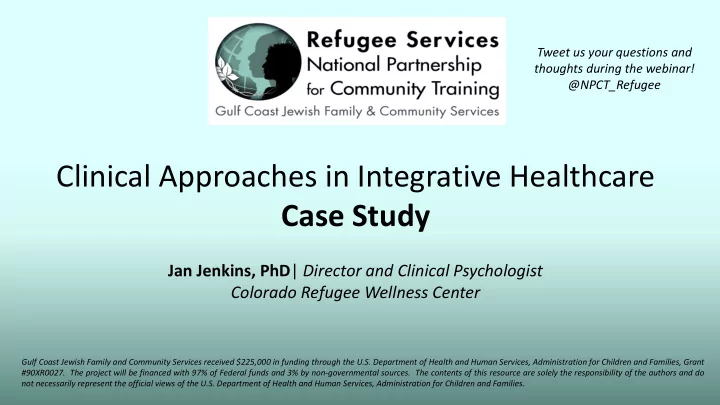

Tweet us your questions and thoughts during the webinar! @NPCT_Refugee Clinical Approaches in Integrative Healthcare Case Study Jan Jenkins, PhD | Director and Clinical Psychologist Colorado Refugee Wellness Center Gulf Coast Jewish Family and Community Services received $225,000 in funding through the U.S. Department of Health and Human Services, Administration for Children and Families, Grant #90XR0027. The project will be financed with 97% of Federal funds and 3% by non-governmental sources. The contents of this resource are solely the responsibility of the authors and do not necessarily represent the official views of the U.S. Department of Health and Human Services, Administration for Children and Families.
Objectives • Describe multi-disciplinary team approach to address complicated mental health concerns among refugees • Connect common physical symptoms that may be associated with a mental health concern and how to identify them • Share therapeutic considerations for refugees seeking care at integrative healthcare settings
Case Study • Presentation • Q&A • Format Features – Dialogue with presenters – Network with national colleagues – Share best practices
Multi-Disciplinary Team Approach • Develop cohesive medical and behavioral health (BH) team – Team-based approach – Communication, Communication, Communication !!! • Across multi-disciplinary staff • Real time consults and scheduled forums, as necessary • Use of “daily huddles” – ONGOING cultural trainings • Coordination among all providers: – Behavioral health providers (BHPs) – Primary care providers (PCPs) – Health navigators • Determine: – Which staff can best address which parts of client’s concerns? – What elements need to be addressed? • Medical • Behavioral • Cultural • Linguistic • Social • Legal
Multi-Disciplinary Approach (cont.) • Have BHPs available within medical clinic • While client is present for medical appointment, consult and schedule follow-up (reduces loss to follow-up) • Screening and Ongoing Services • Use of culturally appropriate screening tools • Appropriate referrals to BH from medical and vice versa • Attend to interwoven physical, psychological, and cultural elements • Somatization as “idiom of distress” • “Culture - bound syndromes”
Identifying Somatic Symptoms (physical symptoms associated with mental health concerns) • Stress and trauma may exacerbate physical symptoms, such as diabetes and hypertension (associated with chronic stress) • Trauma-informed care • Treat both physical symptoms and underlying stress/trauma • Common physical symptoms, especially if unresponsive to medical intervention, may stem from BH concerns • Rule out medical etiology FIRST • Examples can include chronic pain, headaches, and gastrointestinal problems • Symptom presentations can cut across various cultures • Consider all perspectives and consult with others: medical, BH, cultural navigator
Identifying Somatic Symptoms (cont.) • “Idioms of distress” • Somatic symptoms generally viewed as socially acceptable manifestations of distress • May be individual symptoms or cluster of symptoms • Examples: fainting, apparent seizures, significant memory loss, wandering, disorientation • Become familiar with culture-bound syndromes, and consider all factors contributing to clinical presentation to avoid stereotyping • Team-based approach encourages holistic care • Leverage PCP’s support to emphasize the importance of BH as part of overall treatment plan • Example: Discussing and supporting medication prescriptions specific to BH concerns • May be better received if introduced from beginning of care • May reduce associated stigma if all patients receive screening are also offered BH services
Therapeutic Considerations • Cultural adaptations of behavioral health services • Cultural humility • Systems coordination • Flexibility • Team-based model addressing trauma • How to address primary/secondary trauma • Communication across disciplines • Real time consultation • Debriefs with navigators • Team meetings (discuss cases and process staff reactions) • Navigators integral to BH treatment approach • Cultural brokers • Part of treatment team • Increased patient access to care • Decreases unnecessary escalation of health issues
Therapeutic Considerations • Setting • Multiethnic, multilingual staff • Physical space include culturally appealing aspects • Engaging clients in BH services given associated stigma • Use of short-term BH interventions • Consider combined focus on physical and mental health • May also include: • Management of health conditions • Promotion of pro-health behaviors • Addressing underlying BH contributors • How to address trauma in screenings and short-term integrated care • Trauma-informed care throughout clinic • Importance of wrap-around services addressing social determinants of health
Contact Information www.gcjfcs.org/refugee partnership@gcjfcs.org 305-349-1221
Recommend
More recommend